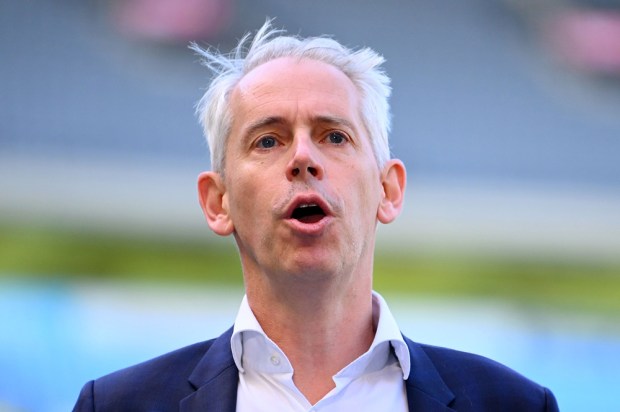Now I know that there are people out there (think of just about everyone who votes for the Greens) who see the world in highly simplified and abstract terms that come pretty close to bumper sticker moralizing. ‘We welcome refugees’. ‘Renewables not Dirty Coal’. ‘Don’t sell our Assets’. You get the idea. Just paint a Manichean world and make it plain that your particular take on things is implicitly the pinnacle of 4 billion years of moral evolution – that by some cosmic fluke your moral antennae quiver at just the perfect Godly frequency. Trot out the trite slogan and then bask in your own sanctimonious, self-perceived moral superiority. Twitter encapsulates this left-wing bumper sticker preaching. So does the ABC’s Q&A with its constant stream of 140 character tweets along the bottom of the screen.
Or you can see the world in terms of incentives and hard-nosed cost-benefit analysis. Leaving the bumper sticker smugness behind, you now assume that disagreement is not because those who differ from you are in need of re-education, or stupid, or evil. Instead, you suppose that those whose views differ from yours are as nice, as smart, and as well-informed as you. Heck, you’d be happy to have a beer with them. They just happen to have a different take than you do on what to do about those claiming to be refugees, or about renewable energy, or about same-sex marriage, or about CO2.
This latter worldview focuses on likely future consequences (think John Stuart Mill) and is closely related to economic thinking with its emphasis on costs and benefits. Rather than trot out smug slogans you ask whether millions more people claiming to be refugees will or will not flood in if Germany takes these hundreds of thousands today. Or what will happen to savings rates if superannuation rules are changed. That sort of thing.
Okay, let’s invoke this approach on the topic of the costs and benefits that flow to political parties when they defenestrate a sitting Prime Minister. So put away for the moment as much emotive baggage as you can when it comes to Messrs Abbott and Turnbull. Try to pretend that we’re talking about Ancient Rome or some faraway place to help make dispassionate analysis easier.
Okay, so what are the likely long-term effects for a political culture when removing a sitting PM by their own Party becomes pretty commonplace? Would you expect this to generate good consequences or bad, all things considered?
Frankly, it’s hard to see such a culture as generating anything but bad consequences, whatever you think of the individual people who are being removed, whatever you think of the replacements, and whether in any individual instance you think your own political policy preferences are likely to win out or lose out with the change. Take the issue of economic reform. Even without the steady stream of recent coups against sitting PMs, Australia already has a constitutional set-up that makes reform tough. We have an elected Upper House that can block the wishes of the governing Party that controls the Lower House. Nothing like that is true in New Zealand (no Upper House at all) nor in Canada nor the United Kingdom (where the Upper House is unelected and so lacks all legitimacy and hence does not veto any committed government plans).
In other words, even without Australia’s spate of political assassinations and the culture it has now created, governments here cannot count on implementing their policies and then leaving it to the voters to pass judgement on them as in the rest of the Westminster world. We in Australia have a big dollop of the American constitutional set-up injected into our own. Reform is already significantly harder here. Heck, it’s probably harder here than in the United States, where the President’s Party sometimes controls the Senate. Consider all the praise heaped on Hawke and Keating for their reforms, only made possible because Mr Howard in opposition supported them. It’s hard to see any party leader doing that today.
But put aside any focus on opposition leaders and consider only sitting prime ministers. With our new culture of killing off sitting PMs, what are the incentives for incumbents to take risks and propose big reforms, and I mean actually try to bring them about as opposed to merely mouthing pious motherhood-type statements or holding 2020 Summits? Think about it. If you’re a PM who is unpopular with the voters for any length of time (something quite likely for anyone trying to legislate big reform type change), your own party may well kill you off. By contrast if you do nothing (think of the State Labor government in Queensland) you may well be sufficiently popular to get back in. The incentives on our top politicians are now all wrong.
Bringing in needed reforms is a whole lot harder to achieve in a political culture in which sitting prime ministers are regularly removed by their own pusillanimous MPs. In Canada and the UK, without this culture, prime ministers can bring in anything they think needs implementing and then hope that over the next five years the initial pain caused is followed by even greater compensating benefits. We have a shorter parliamentary term between elections. Our elected Senate forces our prime ministers to negotiate with Jacqui Lambie and Clive Palmer-types. And now our political culture adds to all that by making it clear to PMs that their fate is not just in the hands of the voters. Four or five dozen MPs will assassinate you if they think you’re lowering their re-election chances.
This looks more like Italy or Greece than like Canada or Britain or New Zealand. It’s a world with no evident long-term benefits. It has been created by MPs in both parties in the last seven years as they have killed off their own side’s sitting PM without giving the voters their say. It’s a toxic culture and it will surprise no one if that same culture fells yet another PM in the not-too-distant future.
Look, bringing down one sitting prime minister every half-century may be regarded as a misfortune; to take out two in a few years possibly carelessness; but to defenestrate three in six years is the sign of a toxic political culture that will inhibit much needed reforms. Consider that a prediction, as well as a lament that the Liberal Party opted to descend to the level of Labor (not to mention to reward backstabbing, white-anting behaviour).
Got something to add? Join the discussion and comment below.
Get 10 issues for just $10
Subscribe to The Spectator Australia today for the next 10 magazine issues, plus full online access, for just $10.
James Allan is Garrick Professor of Law at the University of Queensland
You might disagree with half of it, but you’ll enjoy reading all of it. Try your first month for free, then just $2 a week for the remainder of your first year.













Comments
Don't miss out
Join the conversation with other Spectator Australia readers. Subscribe to leave a comment.
SUBSCRIBEAlready a subscriber? Log in